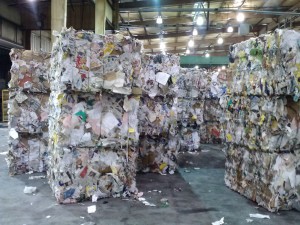Single stream recycling is largely available for residents and businesses throughout most of Hampton Roads. This type of recycling allows people to put all types of materials from paper to plastic to cardboard in a single recycling container. Single stream recycling has been a wonderful convenience to our residents and has reduced the use of landfill space. It has also provided valuable materials for reprocessing and manufacturing new products. Recycling, as an industry, is running into some challenges. World markets (particularly in China) have seen a downturn in commodity prices: oil prices worldwide have declined decreasing the value of plastics; newsprint is not in demand as it once was; and finally there is contamination of recycled materials. We may feel powerless to change oil presses or demand for recycled newsprint, but contamination is something we can all help to reduce and prevent.
Did you know that during local recycling audits contamination of single stream recycling can range between 6 percent and 30 percent of materials collected? This is according to periodic audits of residential recycling collected at curbside in Newport News. This means that of the curbside recycling collected, up to 30 percent should have never been recycled in the first place.
Most of contamination is preventable. There are several “frequent offenders” that do not belong in ANY local curbside recycling bin including plastic grocery bags, Styrofoam, dog leashes, garden hoses, clothing, diapers, food contaminated paper/cardboard (like pizza boxes), and wax coated cardboard (like milk/juice cartons). While some of these items are recyclable in programs in other parts of the country, they are not here in Hampton Roads. Some of these items, such as plastic grocery bags, are recyclable at grocery stores and other retailers.
Contamination causes a great deal of problems for the businesses (called Material Recovery Facilities or MRFs) responsible for processing our items recycled at curbside. Misplaced materials can cause equipment to jam and possible injury to personnel. Did you know that plastic grocery bags in your curbside recycling carts can shut down a facility for up to two hours per day? Plastic bags have to be cut out of the gears and moving parts of the machinery. Other contamination like food waste, for example, can significantly devalue recycled materials. This causes a major cost to the processors and that cost is passed on to the cities, counties, businesses and other organizations that provide recycling program.
So what can you do? “Recycle More Right” by knowing what goes into your curbside recycling bin. You can download a helpful flyer with information on what goes into your recycling container and share it with neighbors and friends. Participate in a recycling audit or do it yourself and see how much contamination is in your own recycling cart.
The next Newport News recycling audit will be announced shortly. The public and civic organizations are invited to participate in the effort. For more information, contact the Newport News Resource Recovery Center at 757-886-7612.
Blog contributed by Daniel A. Baxter, Business Recycling Coordinator for Newport News and Chairman of the askHRgreen.org Recycling & Beautification Committee.
